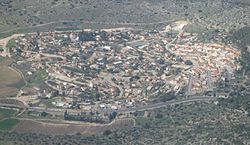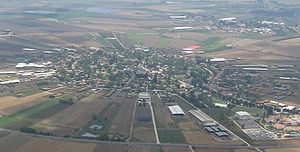- Moshav
-
Moshav (מוֹשָׁב, plural מוֹשָׁבים moshavim, lit. settlement, village) is a type of Israeli town or settlement, in particular a type of cooperative agricultural community of individual farms pioneered by the Labour Zionists during the second aliyah (wave of Jewish immigration during the early 20th century). A resident or a member of a moshav can be called a "moshavnik" (מוֹשַׁבְנִיק).
The moshavim are similar to kibbutzim with an emphasis on community labor. They were designed as part of the Zionist state-building program following the Yishuv ("settlement") in the British Mandate of Palestine during the 20th century, but contrary to the collective kibbutzim, farms in a moshav tended to be individually owned but of fixed and equal size. Workers produced crops and goods on their properties through individual and/or pooled labour and resources and used profit and foodstuffs to provide for themselves. Moshavim are governed by an elected council (Hebrew: ועד, va'ad, lit. committee). Support of the community was done through a special tax (Hebrew: מס ועד, mas va'ad, lit. committee tax). This tax was equal for all households of the community, thus creating a system where good farmers were better off than bad ones, unlike in the communal kibbutzim where (at least theoretically) all members enjoyed the same living standard. Many moshavim still exist today.
Contents
Different types
There are several variants, of which the most common are:
- Moshav ovdim (Hebrew: מושב עובדים, lit. workers' moshav), a workers cooperative settlement. This is the more numerous (405) type and relies on cooperative purchasing of supplies and marketing of produce; the family or household is, however, the basic unit of production and consumption.
- Moshav shitufi (Hebrew: מושב שיתופי, lit. collective moshav), a collective smallholder's settlement that combines the economic features of a kibbutz with the social features of a moshav. Farming is done collectively and profits are shared equally. This form is closer to the collectivity of the kibbutz: although consumption is family- or household-based, production and marketing are collective. Unlike the moshav ovdim, land is not allotted to households or individuals, but is collectively worked.
History
The first moshav, Nahalal, was established in the Jezreel Valley (also known as the Valley of Esdraelon) on September 11, 1921. By 1986 about 156,700 Israelis lived and worked on 448 moshavim; the great majority of these are divided among eight federations.
Because the moshav organization retained the family as the center of social life, it was much more attractive to traditional Mizrahi immigrants in the 1950s and early 1960s; they eschewed bold experiments, like communal child-rearing or equality of the sexes, practiced by the more radical communal kibbutz. These so-called "immigrants' moshav" (Hebrew: מושב עולים, moshav olim) were one of the most-used and successful forms of absorption and integration of Oriental immigrants; it allowed them a much steadier ascent into the middle class than did life in some development towns. For this reason, the moshav became largely a Mizrahi institution, whereas the kibbutz movement remained basically an Ashkenazi institution.
Since the 1967 war, both the moshavim and kibbutzim have relied increasingly on outside — particularly Arab — labor. Financial instabilities in the early 1980s hit many moshavim hard, as did their high birth rate and the problem of absorbing all the children who might wish to remain in the community. By the late 1980s, increasingly more moshav members became employed in non-agricultural sectors outside the community, so that some moshavim began to resemble suburban or exurban villages whose residents commute to work. In general however, moshavim never enjoyed the "political elite" status afforded to kibbutzim during the period of Labor dominance; correspondingly the moshavim did not endure the decline in prestige experienced by kibbutzim in the 1970s and 1980s, during the period of Likud dominance starting in 1977.
List of moshavim
- Aderet
- Adirim
- Amirim
- Amqa
- Argaman
- Ashalim
- Aviel
- Aviezer
- Avigdor
- Avihayil
- Avital
- Avivim
- Avnei Eitan
- Balfouria
- Bedolah
- Be'er Tuvia
- Beit Elazari
- Beit Gamliel
- Beit Hanan
- Beit Hanania
- Beit Lehem HaGlilit, Bethlehem of Galilee
- Beit Meir
- Beit Yitzhak
- Beit Zayit
- Ben Shemen
- Bitzaron
- Beka'ot
- Dekel
- Dishon
- Dor (moshav)
- Even Menachem
- Even Sapir
- Ein HaBesor
- Ein Yahav
- Gadid
- Gan HaDarom
- Gan HaShomron
- Gan Or
- Gilat
- Gimzo
- Gitit
- Giv'at Hen
- Giv'at Ye'arim
- Giv'ati
- Hagor
- Hamra
- HaOn
- Hogla
- Idan
- Katif
- Kfar Malal
- Kfar Mordechai
- Kfar Sirkin
- Kmehin
- Maor
- Margaliot
- Masua
- Mehola
- Mekhora
- Meron
- Mevo Modi'im
- Morag
- Nahalal
- Na'omi
- Nehalim
- Neot HaKikar
- Netaim
- Netiv HaAsara
- Netiv HaGdud
- Netzer Hazani
- Nevatim
- Neve Ativ
- Nir Akiva
- Nir Banim
- Odem
- Ofer
- Ora
- Orot
- Otzem
- Paran
- Petza'el
- Ramat Raziel
- Rishpon
- Ro'i
- Sde David
- Sde Nitzan
- Sde Uziyahu
- Sde Ya'akov
- Shadmot Devora
- Shadmot Mehola
- Talmei Yosef
- Telamim
- Tomer
- Vered Yeriho
- Ya'ad
- Yakhini
- Yad Rambam
- Yad Natan
- Yafit
- Yanuv
- Yated
- Yesha
- Yitav
- Yodfat
- Yonatan
- Zar'it
- Zohar
References
- "Kibbutz and Moshav." Chapter 2. Israel : a country study. ed. Helen Chapin Metz. Federal Research Division, Library of Congress. 1990. Lcweb2.loc.gov
Cooperative settlements in Israel By type OthersBy movements ExistingAgricultural Union · Amana · HaMerkaz HaHakla'i · HaOved HaTzioni · Hapoel HaMizrachi · Hitahdut HaIkarim · Kibbutz Movement · Mishkei Herut Beitar · Moshavim Movement · Poalei Agudat Yisrael · Religious Kibbutz MovementDefunctHaKibbutz HaMeuhad · Ihud HaKvutzot VeHaKibbutzim · Kibbutz Artzi · United Kibbutz MovementCategories:- Agricultural cooperatives
- Agricultural labor
- Moshavim
- Hebrew words and phrases
- Intentional communities
- Rural community development
- Agriculture in Israel
- Cooperatives in Israel
Wikimedia Foundation. 2010.


